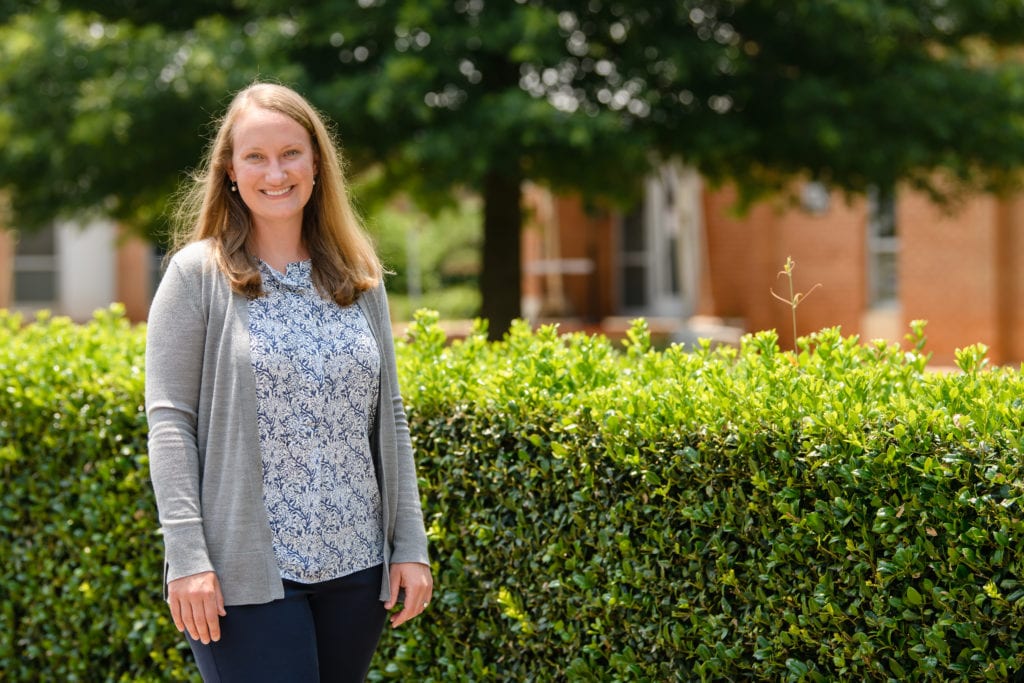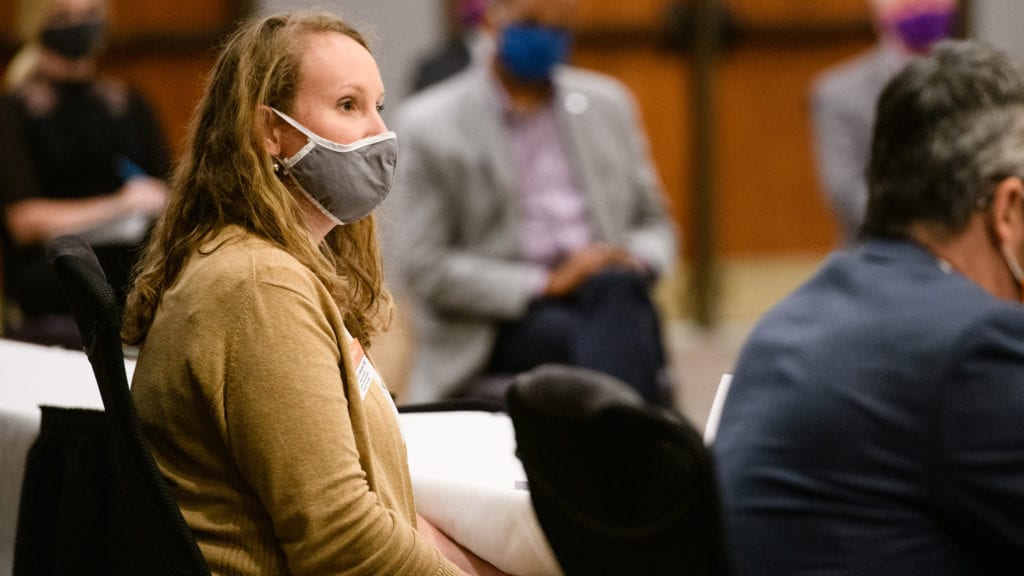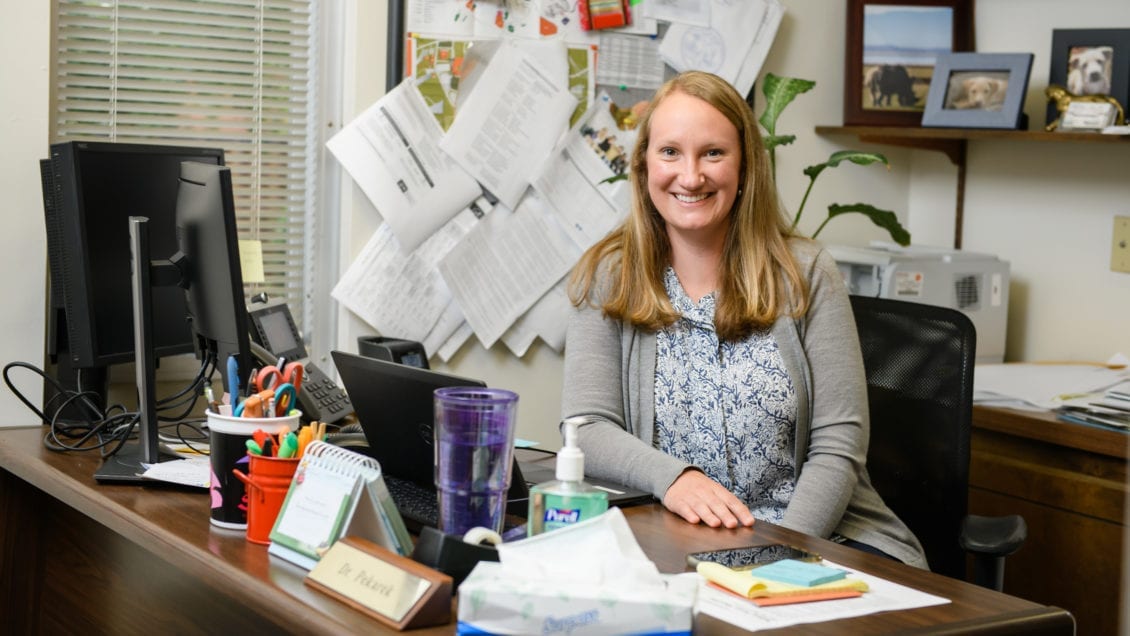Lesslie Pekarek’s life was supposed to slow down.
In November 2019 she had earned a full-time appointment as director of medical services at Redfern Health Center. After more than a year serving in an interim capacity — which entailed newly assumed administrative responsibilities in addition to seeing a full patient load as a staff physician — she was looking forward to expanding her reach to other areas of the Clemson University campus.
She just didn’t expect it to come so quickly and in such an unrelenting fashion.
“It snowballed,” said Pekarek, a Clemson alumnus. “I was out of town the last week of February — the first week the Emergency Operations Center was activated because of COVID-19. I developed acute appendicitis and had to have my appendix removed while I was in Denver. When I came back the first week of March, I was embedded with the EOC from then on.”
As the global pandemic has evolved, so too has Pekarek’s role. She has served as a clinical consultant for the Research and Education in Disease Diagnosis and Intervention (REDDI) lab, key to Clemson’s aggressive approach to COVID-19 testing. She has worked intensely with the South Carolina Department of Health and Environmental Control (DHEC) on isolation and quarantine requirements for COVID-positive patients and close contacts.
In the Fall 2020 semester, Pekarek personally called patients for about 18 hours on a single Saturday during the height of the pandemic that saw more than 600 Clemson students in on-campus isolation or quarantine housing.
“I’d be in bed at 11 o’clock at night and my phone would ring,” she said. “For months, every Saturday and Sunday evening was spent calling patients. It was so new and everyone who was positive or had to quarantine was in a full-blown panic. We weren’t prepared for that volume, that quickly.”
Pekarek said figuring out isolation and quarantine protocols, developing a reliable contact tracing regimen and hiring additional staff and training them to assist with the process has been the most difficult part of the past 15 months. She’s fielded calls from colleagues who were in tears, overwhelmed at the toll the pandemic has taken on the University and its people.

As difficult as it’s been, she’s equally appreciative of how COVID-19 has expanded her role on campus beyond Redfern Health Center. Her boss, Dr. George Clay, said she’s been an inspiration to colleagues throughout Student Health Services and the University at-large.
“We remain extremely grateful for the professionalism, commitment and generous spirit Lesslie has demonstrated throughout the pandemic,” said Clay, Redfern’s executive director. “Her leadership, medical expertise and knowledge of public health have been indispensable to the planning and implementation of our emergency response so the University could continue to operate. Her determination, supportive attitude and fortitude were on full display as she worked 24/7 to ensure the health, safety and wellness of others.”
Pekarek joined the Student Health Services team in 2016 after spending nearly six years as a family physician at Baptist Easley Hospital. In addition to caring for students, Pekarek oversees Redfern’s staff of physicians, nurse practitioners, as well as laboratory and radiology services.
She’s no stranger to Clemson, having grown up in the area. She attended D.W. Daniel High School and earned an undergraduate degree in microbiology from Clemson. While in school, she took every opportunity to get involved. She was in a sorority, Kappa Alpha Theta. She chaired the health and human services committee for student government. She was a tutor in the Student-Athlete Enrichment Center and served as an Orientation Ambassador.
Following Clemson, she earned her M.D. from the Medical University of South Carolina (MUSC) in 2007 before completing her residency at Self Regional Healthcare in Greenwood.
When she was contacted by Clay to fill an opening for a physician, she said it was a dream come true. She instantly fell in love with college health.
“This has to be a calling,” she said, referring to Student Health Services. “We can’t compete with big hospital systems, we know that. People have to really enjoy working with the student patient population. You’re dealing with young adults who are in charge of their own health care decisions for the first time in their life, in most cases. It’s a challenging, but exceedingly rewarding environment.”
Nothing has challenged Pekarek more than striking the appropriate work-life balance over the past 15 months. Her husband, Jeff, also graduated from Clemson and works in the forestry industry inspecting timber products throughout the Southeast region. Together, they have two boys, J.B. (9) and Will (7).

And even though rigorous standards have been lessened recently at the University as vaccinations have increased throughout the United States, Pekarek is still devoting most of her time to emergency response.
“From the first day Dr. Pekarek came to the EOC, it was clear she would be a great source of key COVID-19 and medical information,” said Sarah Custer, Clemson’s director of emergency management. “She has always been willing to talk through ‘Just one more thing’ before we end a call or leave for the day. Our team has come to appreciate and admire her level of critical thinking, understanding of the broader University needs and deep level of compassion and care she has for our students. I’ve come to respect her as a doctor, leader, EOC member and cherish her as a friend.”
Pekarek looks forward to soon returning to a more regular patient load in the exam room and reconnecting with her favorite part of the job — seeing students.
“I miss those relationships,” she said. “I’ve enjoyed getting to know lots of students from various backgrounds. I’m not sure I’ll ever go back to quite the same patient load as before, because we’ve proven what a valuable resource we can be from a medical consultation standpoint. COVID is not going away; there will continue to be bumps in the road. But things are improving and we’re on the right path.”
And hopefully, for Pekarek’s sake, a somewhat slower path.

